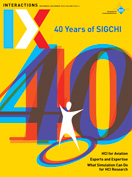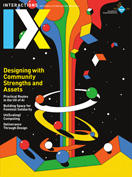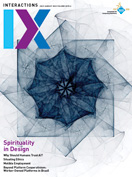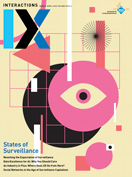Authors:
Kandrea Wade, Alex Taylor, Daniela Rosner, Mikael Wiberg
You are what you eat" is a common expression linking eating habits to health. Adapting this for the Internet era, we might say, "You are what you click on." In short, the seemingly private and individual actions we take online generate digital traces, and these traces in turn are seen to reflect us. Through models and aggregations, they are treated as a proxy for our bodies and behaviors, and also our wishes and desires. It has become all too easy to be inured to this persistent digital surveillance. Its ubiquity and intensification has become a by-product of our times, a "datacene" in which we are conditioned to obsessively scroll, click, like, and check-in—thereby producing and reproducing the conditions for mass observation.
This issue offers diverse perspectives on the technologized states of surveillance that pervade contemporary life. Both regular and invited articles provide critical viewpoints and, crucially, thoughts on disruption and resistance. In his column, Jonathan Bean describes what has become the "shared expectation" of surveillance, highlighting the complex terrain many navigate between privacy and surveillance. If asked, many would prioritize privacy; yet, when faced with the choice, they rarely navigate to the widgets and privacy dashboards ostensibly (and convolutedly) designed to protect anonymity. On the one hand, convenience and perhaps ambivalence appear to be at the root of this malaise; on the other, there seems to be no genuine choice—surveillance has not only become a necessary part of participating in daily life, it has become an inevitability.
The seemingly private and individual actions we take online generate digital traces, and these traces in turn are seen to reflect us.
Janelle Mason's Standpoint provides us with a lexicon for the varied forms of state-based and commercial surveillance, set alongside its underpinning technologies. Through this lexicon, she points to the need for robust legislation that will protect citizens' privacy (reinforcing the concept and necessity of rights for the digital citizen). The importance of understanding the conditions of surveillance and citizens' rights is vividly brought to light in Subhashish Panigrahi's provocative film Marginalized Aadhaar and its accompanying text (Space). Through Panigrahi's work, we learn that the effects of surveillance—no matter how well intended—can be uneven and often discriminatory. In India, the state's intervention to deliver basic amenities to all, using biometric monitoring, perversely enacts a statelessness for those already at the margins—the technical and political entangle to determine who should count and who is beyond counting.
In the second Standpoint, Alex Jiahong Lu situates his thinking amid similar conditions. Like Panigrahi, Lu considers the ways in which surveillance intersects with existing modes of oppression. Through his work examining macro-level surveillance of Chinese citizens and the meso-level monitoring in classrooms, his aim is first to recognize the forms of surveillance and in turn further enable modes of negotiation and resistance. Two of the regular formats in this issue set the stage for similar possibilities. In The Co-, Jaz Hee-jeong Choi and Roopa Vasudevan discuss the ways of seeing enacted through surveillance. They speculate on dataflows that are tied more to bodily, affective, and other-than-human relations, relations that might resist and provide an alternative to a monocular eye that enforces uniformity. In Making/Breaking, experimental visual work from Tom Bieling, Frieder Bohaumilitzky, Anke Haarmann, and Torben Körschkes can be read as an invitation to rethink the sites and spaces of observation, to shift the material conditions so that rather than a persistent surveillance from nowhere, situated unrest, intervention, and speculation become possible.
Two of this issue's forums surface another specific mode of surveillance: surveillance capitalism. Both Sareeta Amrute and Jana Fedtke and her colleagues examine the logics of enumeration on social media sites and the damaging consequences of reducing bodies and behaviors to transactional data points (making tasks easier for machines but on the whole harder for humans). Again, governance would appear to be critical. Separately, but with a common voice, Amrute and Fedtke demonstrate that the nuances of discrimination and inequity on social media platforms must be made visible. For inclusive and democratic societies to flourish, authority and power must be made accountable and, ultimately, must be better distributed.
Finally, two of our contributions underscore our own complicity in the logics of surveillance. In What Are You Reading, Onur Arslan gives us a glimpse of observation turned inside out, as it were. In Arslan's account, it is the observer, or the ethnographer, who is transformed into subject. He shows how surveillance states can subvert and undermine the analytical eye of the researcher and shift the ground of that which is researched. Choi and Vasudevan's column also offers a reminder that we are inevitably implicated in the structures and practices of surveillance. Vasudevan suggests we "take stock both of how we are surveilled and how we are complicit in the surveilling." This, she says, "may make us uncomfortable, but ultimately is the only way we can imagine viable alternatives."
Emerging from all this work is a strong narrative attending to the societal issues of surveillance. Here we see surveillance to be systemic and based around historical biases in the physical world. Today this is being translated, at lightning speed and at an incomprehensible capacity, into the digital world. Amid this intensification, certain individuals belonging to specific identities, typically marginalized groups and people of color, are affected by the implications of surveillance more than others are. Yet, we do have control over this phenomenon—humans are still behind how technology makes the decisions that it does. Until we are able to take responsibility and work to change society, our systems will continue to replicate our flaws and biases; and surveillance, specifically, will remain a dangerous and oppressive space for those who have historically been seen as "lesser than."
The content in this issue presents diverse and thought-provoking views into the surveillance so many feel subject to. As editors, our hope is that the varied articles are not only informative but also extend existing projects and stimulate new projects of resistance and speculation. The oppressive atmosphere and omnipresence of surveillance suggest we need it.
Kandrea Jocelle Wade (guest editor) [email protected]
Alex Taylor, Daniela Rosner, Mikael Wiberg [email protected]
Copyright held by authors
The Digital Library is published by the Association for Computing Machinery. Copyright © 2022 ACM, Inc.







Post Comment
No Comments Found